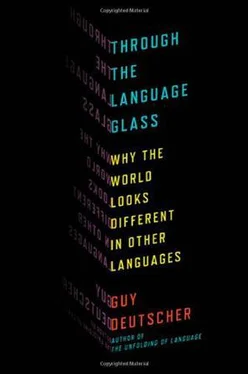Apprehending my Confusion, my Host intoned the Moral with much wagging of his Finger: “And thus remember: never fail to distinguish a Rird from a Bose!” I offered him my sincere Assurance that I would endeavour never to do so.
What do you take this precious document to be? An undiscovered diary of an early explorer or a lost sequel to Gulliver’s Travels ? If you opted for fiction, it is probably because your common sense tells you that the purported Ziftish manner of distinguishing concepts is fundamentally implausible, and that it is patently unnatural to combine red-chested birds and non-white roses into one concept, “rird,” and to lump other birds together with white roses into the concept “bose.” And if the Ziftish distinction between rird and bose is unnatural, the English division between bird and rose must in some way be natural. Healthy common sense suggests, therefore, that while languages can bestow labels entirely at whim, they cannot apply quite the same whimsy to the concepts behind the labels. Languages cannot group together arbitrary sets of objects, since it is birds of a feather that flock together under one label. Any language has to categorize the world in a way that brings together things that are similar in reality-or at least in our perception of reality. So it is natural for different types of birds to be named as one concept, but it is unnatural for a random set of birds and a random set of roses to be gathered together under one label.
In fact, even a cursory observation of the way children acquire language will confirm that concepts such as “bird” or “cat” or “dog” have something natural about them. Children ask almost all imaginable (and many unimaginable) questions. But have you ever heard a child saying, “Mommy, is this a cat or dog?” Rack your brains and rummage through your memories as hard as you can, you are unlikely to recall a child asking, “How can I tell if this is a bird or a rose?” While children always need to be taught the labels for such concepts in the particular language of their society, they don’t need to be told how to distinguish between the concepts themselves. It is quite enough for a toddler to see a few pictures of a cat in a picture book, and the next time she sees a cat, even if it’s ginger rather than tabby, even if it has longer hair, a shorter tail, only one eye, and a hind leg missing, she will still recognize it as a cat rather than a dog or bird or rose. Children’s instinctive grasp of such concepts shows that human brains are innately equipped with powerful pattern-recognition algorithms, which sort similar objects into groups. So concepts such as “cat” or “bird” must somehow correspond to this inborn aptitude to categorize the world.

So far, then, we seem to have arrived at a simple answer to the question of whether language reflects culture or nature. We have drawn a neat map and divided language into two distinct territories: the domain of labels and the land of concepts. The labels reflect cultural conventions, but the concepts reflect nature. Each culture is free to bestow labels onto concepts as it pleases, but the concepts behind these labels have been formed by the dictates of nature. A great deal can be said for this partition. It is clear, simple, and elegant, it is intellectually and emotionally satisfying, and, last but not least, it has a respectable pedigree that extends all the way back to Aristotle, who wrote in the fourth century BC that, although the sounds of speech may differ across the races, the concepts themselves-or, as he called them, the “impressions of the soul”-are the same for the whole of mankind.
Are there any possible objections to this map? Just one: it bears scant resemblance to reality. The neat border we have just marked may be a pretty work of wishful cartography, but unfortunately it does not represent the actual power relations on the ground with any accuracy. For in practice, culture not only controls the labels, but embarks on incessant raids across the border into what ought to be the birthright of nature. While the distinction between some concepts, such as “cat” and “dog,” may be delineated so clearly by nature that it is largely immune to culture’s onslaught, cultural conventions do manage to meddle in the internal affairs of many other concepts, in ways that sometimes upset plain common sense. Just how deeply culture penetrates the land of concepts, and how difficult it can be to come to terms with this state of affairs, is something that will become clearer in the following chapters. But for the moment, we can start with a quick reconnaissance tour of a few of culture’s strongholds across the border.
Consider first the realm of abstraction. What happens when we move away from simple physical objects like cats or birds or roses to abstract concepts such as “victory,” “fairness,” or “Schadenfreude”? Have such concepts also been decreed by nature? I once knew someone who enjoyed saying that the French and the Germans have no mind. What he meant was that neither of their languages had a word for the English “mind,” and he was right in one sense: neither French nor German has a single concept, with a single label, that covers exactly the range of meanings of the English concept “mind.” If you ask a bilingual dictionary how to translate “mind” into French, the dictionary will explain patiently that it depends on the context. You will be given a list of possibilities, such as:
esprit (peace of mind = tranquillité d’esprit )
tête (it’s all in the mind = c’est tout dans la tête )
avis (to my mind = à mon avis )
raison (his mind is going = il n’a plus toute sa raison )
intelligence (with the mind of a two-year-old = avec l’intelligence d’un enfant de deux ans )
Conversely, English does not have a single concept that covers exactly the range of meanings of the French esprit , as Bertrand Russell so spiritedly observed. Again, a dictionary would give a long list of different English words as possible translations, for instance:
wit ( avoir de l’esprit = to have wit)
mood ( je n’ai pas l’esprit à rire = I’m in no mood for laughing)
mind ( avoir l’esprit vif = to have a quick mind)
spirit ( esprit d’équipe = team spirit)
So concepts like “mind” or “ esprit ” cannot be natural in the way that “rose” or “bird” are; otherwise they would have been identical in all languages. As early as the seventeenth century, John Locke recognized that in the realm of abstract notions each language is allowed to carve up its own concepts-or “specific ideas,” as he called them-in its own way. In his 1690 Essay concerning Human Understanding , he proved the point through the “great store of words in one language which have not any that answer them in another. Which plainly shows that those of one country, by their customs and manner of life, have found occasion to make several complex ideas, and given names to them, which others never collected into specific ideas.”
Nature’s first concession to culture has not come as too much of a wrench, for even if the neat borderline between culture and nature has to be redrawn somewhat, the notion that cultural conventions are involved in determining the shape of abstract concepts is not seriously at odds with our basic intuition. After all, if instead of the story about the Ziftish concepts “bose” and “rird,” the eighteenth-century travelogue reported that Ziftish didn’t have a single word that corresponds to the English concept “fair” and that in lieu of it Ziftish uses the concept “just” in some contexts and “kind” in other contexts, our common sense would hardly be mobilized to march in protest.
Читать дальше












